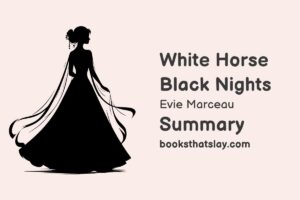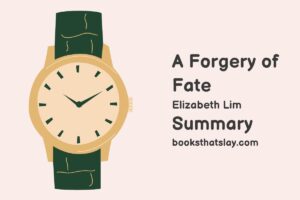A Power Unbound Summary, Characters and Themes
A Power Unbound by Freya Marske is the final book in the Last Binding trilogy, a queer historical fantasy set in Edwardian England. It blends lush prose with political intrigue, forbidden magic, and intense emotional stakes.
The novel follows a diverse group of magical rebels attempting to overthrow an oppressive magical contract that binds society’s power to an elitist few. At its core is a slow-burn romance between Jack Alston, an aristocratic former magician burdened by a family tragedy, and Alan Ross, a working-class journalist with disruptive magical abilities.
Together, they must face internal trauma and external threats to rewrite the rules of magic—and power—forever.
Summary
The story begins in 1893 at Cheetham Hall, where young twins Jack and Elsie Alston attempt a magical experiment under the watchful eyes of their uncle John and cousin George. The spell goes awry when John tries to steal their shared magic.
The outcome is tragic: Jack is left almost powerless, while Elsie becomes dangerously saturated with unstable magic. The incident is covered up, and the twins are bound by a secrecy spell.
Years later, in 1909, Jack lives in Spinet House, a sentient magical estate. He has distanced himself from magic and society.
Jack is drawn back into the world of power and politics when Spinet becomes a battleground for rival magical factions. Maud, Violet, and Robin—friends and magical allies—join Jack to locate a crucial artifact: the knife of the Last Contract.
This contract is a powerful magical agreement made with the fae that still controls England’s magical systems. Alan Ross, a sharp-tongued journalist from a working-class background, arrives unexpectedly.
Alan is a “perturbator,” someone whose presence disrupts magic. Though initially combative and distrustful, Alan joins the group due to his resistance to magical influence and a growing attraction to Jack.
Despite their differences in class and temperament, Jack and Alan become reluctantly bonded by circumstance—and eventually by affection. As they explore the labyrinthine Spinet House, Alan’s disruptive power allows them to bypass magical protections.
They discover a hidden chamber that houses the knife, but it’s heavily protected. Their first attempt to access it injures Edwin and partially collapses the house.
Jack proves his courage by rescuing Edwin. His vulnerability emerges as he shares the trauma of Elsie’s fate with Alan.
Their bond deepens amid attacks from their enemies: George Bastoke and John Alston, who seek to reforge the Last Contract for personal power. With mounting threats and time running out, the group finally retrieves the knife.
The knife is a fae-forged glass blade that resists magical containment. Alan alone can hold it without harm, due to his unique magic-nullifying presence.
Forced to flee Spinet House, the group regroups in London to prepare for the Equinox Gala. This is a pivotal meeting of the Magical Assembly.
Jack and Alan finally acknowledge their feelings for one another. Their moment of shared intimacy brings emotional release and strengthens their trust.
Meanwhile, Edwin and Robin devise a plan to use the knife’s power to dismantle the Last Contract’s structure. At the Gala, Jack and his allies face their enemies amid a tense and glamorous political gathering.
George attempts to sway the Assembly and seize magical control. Jack’s team counters with evidence, magical theory, and Alan’s unique abilities.
When George and John unleash a forbidden spell, the hall itself reacts violently. Jack risks reconnecting with magic, using Alan as an anchor, to help Edwin complete the ritual that breaks the Last Contract’s bindings.
The backlash nearly kills Alan. Jack saves him, affirming their love and restoring balance.
With the Last Contract broken, the magical structure of Britain begins to change. Power is no longer confined to bloodlines and aristocracy.
George and John are arrested. New leadership emerges in the Assembly, advocating for equity and ethical use of magic.
In the end, Jack and Alan choose to remain together—not only as lovers, but as partners in building a better world. Jack reconciles his past, Alan embraces his magical identity, and the future of British magic opens up to those previously excluded.

Characters
Jack Alston (Lord Hawthorn)
Jack Alston emerges as a haunted and complex figure, shaped by loss, duty, and a longing for redemption. Once a confident aristocrat and magical prodigy, the failed experiment with his twin sister Elsie scarred him deeply.
It stripped him of both power and self-trust. Throughout the story, Jack battles this inner void, masking his vulnerability with aloofness and snide wit.
Despite this, his sense of responsibility remains unwavering, especially toward those he cares about. He risks himself to save Edwin and protect Alan.
His interactions with Alan peel back layers of repression, revealing a man capable of deep affection and passion. As he grows emotionally, Jack reconciles with his past, especially regarding Elsie.
He ultimately accepts a more balanced identity. He becomes someone neither bound to the magical heir he once was, nor to the broken man he feared he’d become.
Alanzo “Alan” Ross
Alan Ross is the quintessential outsider: a working-class journalist, a perturbator whose presence disturbs magic, and a man with a sharp tongue and an even sharper distrust of privilege. His early interactions are marked by caustic humor and deeply ingrained skepticism, particularly toward the likes of Jack.
Beneath the bravado lies a man shaped by familial loyalty and the burdens of survival. His love for his sister Bella and his sacrifices reveal a softer core.
Alan channels rage and wit into subversive writing. His arc is one of reluctant awakening—not only to magical potential, but also to emotional vulnerability.
His romance with Jack, built on mutual antagonism, becomes a crucible for growth. Alan steps into his role as a wielder of the knife and as someone worthy of love and trust.
Edwin Courcey
Edwin Courcey serves as both scholar and strategist in A Power Unbound. His meticulous nature and magical theory expertise provide the team with clarity and direction.
Though not always in the action’s forefront, Edwin’s contributions are vital. His work in unraveling ley lines and dismantling the Last Contract is instrumental.
Edwin’s quiet conviction stands out. He believes in justice and change, and he challenges magical institutions to realize both.
His loyalty to Robin and calm leadership offer stability amidst chaos. Edwin exemplifies the idea that knowledge, paired with empathy, is a powerful force.
Violet Debenham
Violet is a beacon of sharp confidence and magical prowess. She moves fluidly between ballroom diplomacy and magical subterfuge.
Pragmatic and fiercely loyal, Violet is unafraid to bend the rules for the greater good. Her relationship with Maud brings emotional depth to her steely demeanor.
She reads people astutely and manipulates expectations with grace. At the Cheetham Hall gala, her strategic skills prove invaluable.
Violet’s presence helps guide Jack and Alan toward self-awareness. She embodies the future of magic: competent, queer, and unapologetically modern.
Maud Blyth
Maud’s magic is rooted in subtlety and illusion. She balances Violet’s intensity with quiet strength and emotional intelligence.
She excels in strategy and support, offering clarity when difficult decisions arise. Her courage is evident during her kidnapping, where she refuses to give in to fear.
Maud trusts her companions and never loses faith in their mission. Though not always the loudest presence, her influence is significant.
She proves that quiet strength and thoughtful timing are as crucial as direct action. Maud reflects the power of trust, collaboration, and inner resolve.
Robin Blyth
Robin Blyth operates in tandem with Edwin, contributing magical strength and insight. His charm and confidence add balance to the group.
While more of a supporting character in this installment, his experience lends gravity to the team’s actions. Robin represents a bridge between tradition and progress.
Having faced earlier magical challenges, Robin is pragmatic and adaptable. His trust in Edwin underscores a deeply bonded partnership.
Robin ensures their mission stays focused and grounded. His presence adds stability and a sense of lived wisdom.
George Bastoke
George Bastoke is the novel’s embodiment of corrupt ambition. He manipulates systems and people to pursue dominance and control.
He believes in magical superiority and cloaks self-interest in noble intentions. His charm masks a ruthless desire to consolidate power.
George’s downfall stems from his refusal to acknowledge shared or consent-based magic. He stands as a cautionary figure for the dangers of inherited entitlement.
Ultimately, George fails because he clings to a past of unjust privilege. His betrayal is poetic: undone by the very magic he sought to control.
John Alston
John Alston is the architect of Jack and Elsie’s trauma. His greed for power sets off the tragedy at the novel’s heart.
Refusing to take responsibility, John continues manipulating others. His partnership with George reveals the rot at the system’s core.
He sacrifices kin and stability in pursuit of dominance. John’s arc represents the most abusive aspects of magical hierarchy.
His end is a reflection of poetic justice. He is consumed by the magic he long sought to weaponize.
Polly Alston (Lady Cheetham)
Polly is a study in quiet resilience and strategic compassion. Though embedded in aristocracy, she subtly works to subvert it.
She protects Jack and shelters Freddy, offering political and emotional support. Her understanding of both society and magic makes her a valuable ally.
Polly helps reform come from within. She exemplifies maternal strength—firm, unassuming, and essential.
Through her, the novel shows that love and grace can be powerful forms of resistance. Polly’s actions quietly shape a more ethical magical world.
Freddy Oliver
Freddy is an emotionally poignant side character. As Jack’s valet and half-brother, he carries hidden truths and quiet loyalty.
His presence reminds readers of the family secrets that haunt the elite. Though unassuming, Freddy’s role is symbolically important.
He represents the complexity of bloodlines and concealed heritage. Polly’s decision to place him with Jack is an act of protection and love.
Freddy may not wield magic or drive the plot, but he grounds Jack’s personal journey. His existence underscores the costs of secrecy and the power of belonging.
Themes
Power and Its Boundaries
A Power Unbound talks about the negotiation between personal agency and the seductive, often destructive lure of magical power. From the opening scene of the twins’ failed experiment at Cheetham Hall, the narrative establishes that power without consent or ethical constraint leads to tragedy.
John’s attempt to draw power from Jack and Elsie leads to irreversible trauma, highlighting how the abuse of authority can leave physical and emotional scars. This theme echoes throughout the book, particularly in how the artifacts of the Last Contract are treated—not as mere magical tools, but as moral and political instruments.
The knife especially serves as a metaphor for both oppression and potential liberation. Alan’s unique ability to wield it safely speaks not to his strength, but to his disruptive nature, his resistance to structured magic, and thus to entrenched systems of control.
Magic in the book is frequently shown to be hierarchical and prejudiced, benefiting the upper classes and those born into power. The Assembly’s eventual reform underscores the need to redistribute magical agency more equitably.
Even Jack, who once wielded great power but lost much of it, is forced to reframe his understanding of strength—not as domination, but as a willingness to act even when powerless. The entire arc of the plot demonstrates that power must be tempered with responsibility and mutual respect, and that institutions must change when they serve only a privileged few.
Class, Identity, and Social Stratification
Class conflict permeates nearly every interaction between Jack and Alan, positioning it as a fundamental tension in the novel. Alan, with his working-class roots and a life forged through grit and self-reliance, resents the aristocratic ease and entitlement that Jack represents.
His journalistic career and secret life as a pornographer are not merely economic necessities but also acts of rebellion against a society that seeks to marginalize voices like his. His discomfort with magic is tied closely to his social position—it has always been something other people use to dominate, exclude, or control.
In contrast, Jack, despite being an outcast within his own class, still benefits from inherited privilege and bears the weight of expectations tied to his lineage. Their romantic relationship cannot be separated from this tension: attraction is constantly shadowed by distrust, defensiveness, and the fear of being condescended to or used.
Yet, the progression of their bond reflects the novel’s larger critique of rigid class hierarchies. Through mutual vulnerability, Jack and Alan begin to dismantle these boundaries, suggesting that true partnership requires both parties to meet each other as equals.
This egalitarian ideal mirrors the political shift in the magical Assembly, which gradually opens itself to broader representation. Class in A Power Unbound is not only a backdrop but a catalyst—driving characters to question the legitimacy of systems that value birthright over merit or compassion.
Queerness, Desire, and Repression
Sexual identity and desire are not just incidental aspects of character development in this novel—they are integral to the thematic fabric of the story. Most principal characters are queer, and the narrative treats queerness as both a personal truth and a subversive force.
For Alan, his sexuality is intimately tied to his marginalization and his resistance to authority. Writing erotica allows him to express what society demands he suppress.
Jack, more repressed and shaped by trauma, must come to terms with his desires through a difficult process of self-confrontation. The erotic tension between them is not romantic fluff—it reflects a broader tension about control, vulnerability, and authenticity.
When Jack reads Alan’s erotic story about him, it functions as a moment of both exposure and awakening. It forces him to confront parts of himself he has denied, particularly his craving to relinquish control in a world where he has been burdened with responsibility from childhood.
This dynamic resonates with the book’s larger exploration of consent—whether magical, sexual, or emotional. The romantic arc culminates in a deeply affirming bond that balances tenderness and raw passion, providing a stark contrast to the exploitative relationships they’ve both endured in the past.
Queerness here is shown as a lens through which to critique broader societal structures: repressive magic laws, classist assumptions, and patriarchal expectations. The narrative offers a vision in which queer love, far from being marginal, becomes a source of strength, clarity, and transformation.
Legacy, Inheritance, and the Burden of the Past
Jack’s entire identity is shaped by inheritance—both in terms of his family name and the magical lineage that defines his place in society. Yet from the outset, this inheritance is shown to be a source of suffering rather than pride.
The tragedy at Cheetham Hall becomes a defining trauma that alienates him from his past and casts a long shadow over his choices. The secrecy imposed by his uncle’s spell is not only a narrative device but a symbol of how aristocratic families often bury their sins in the name of honor and continuity.
In contrast, Alan’s inheritance is one of silence and stigma. His magical perturbation is treated by his family as demonic or dangerous, emblematic of how working-class families are often forced to interpret extraordinary phenomena through fear rather than opportunity.
The artifacts of the Last Contract themselves are relics of a power structure built on exploitation—an inheritance that must be dismantled rather than preserved. Throughout the book, characters must reckon with what they’ve inherited, both materially and emotionally.
Reconciliation is only possible when these legacies are reinterpreted, when secrecy is replaced by truth, and when love is prioritized over lineage. Jack’s journey to reconcile with Freddy, his half-brother, further reflects this shift—moving from shame and concealment toward openness and belonging.
Ultimately, the theme of legacy evolves from something that binds and burdens to something that can be consciously reshaped.
Rebellion, Justice, and Structural Change
At its core, A Power Unbound is not just a romantic fantasy but a political novel about revolution—albeit on a magical stage. The three artifacts—coin, cup, and knife—are not MacGuffins but symbols of systemic control.
The Last Contract represents a social order built on constraint and inequality, where magic is a commodity regulated by the elite. The protagonists’ mission to dismantle it is a call for justice that parallels real-world struggles against institutionalized oppression.
George and John, the antagonists, are not evil for the sake of plot—they embody the arrogance of those who believe they are entitled to power by virtue of tradition. Their eventual downfall is significant not just for the characters’ personal arcs but for the entire magical society.
The climax at the Equinox Gala is structured like a political reckoning: the exposure of corruption, the mobilization of new coalitions, and the reshaping of governance. Alan and Jack’s role in this transformation—both as individuals and as a couple—reinforces the idea that personal healing and political change are intertwined.
Justice in the novel is not about revenge, but about rebuilding institutions with transparency, equity, and empathy. The book closes on a note of cautious optimism, suggesting that even ancient, deeply entrenched systems can be reformed if people are willing to stand together, challenge power, and imagine a different future.


